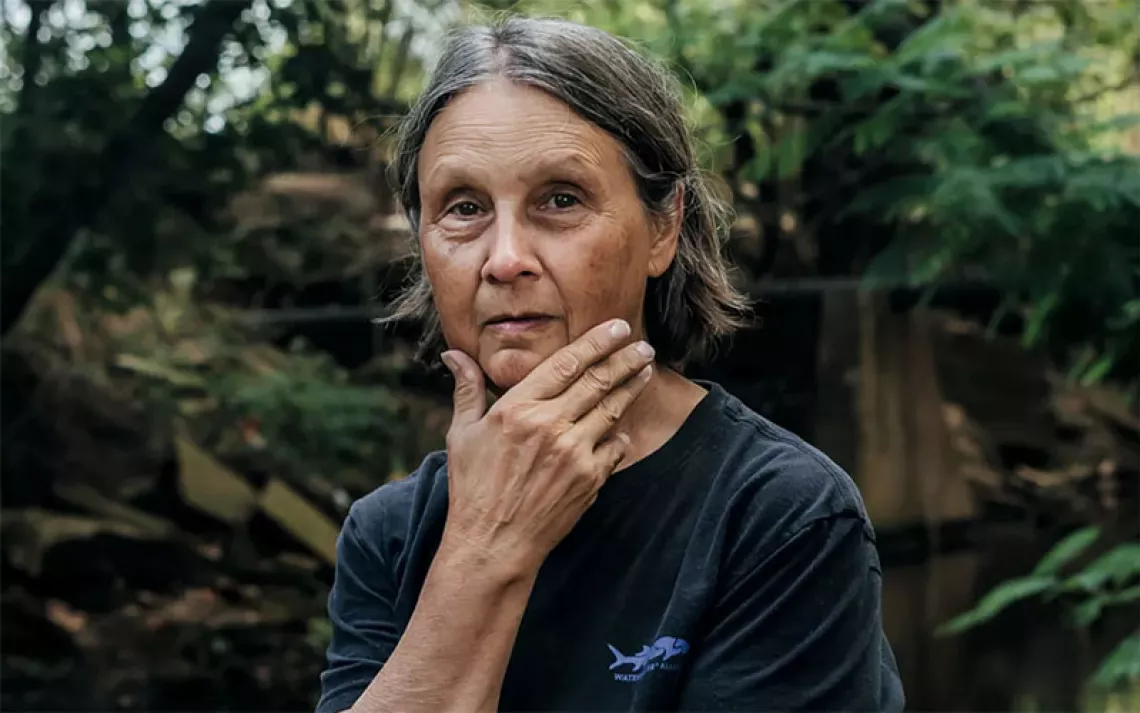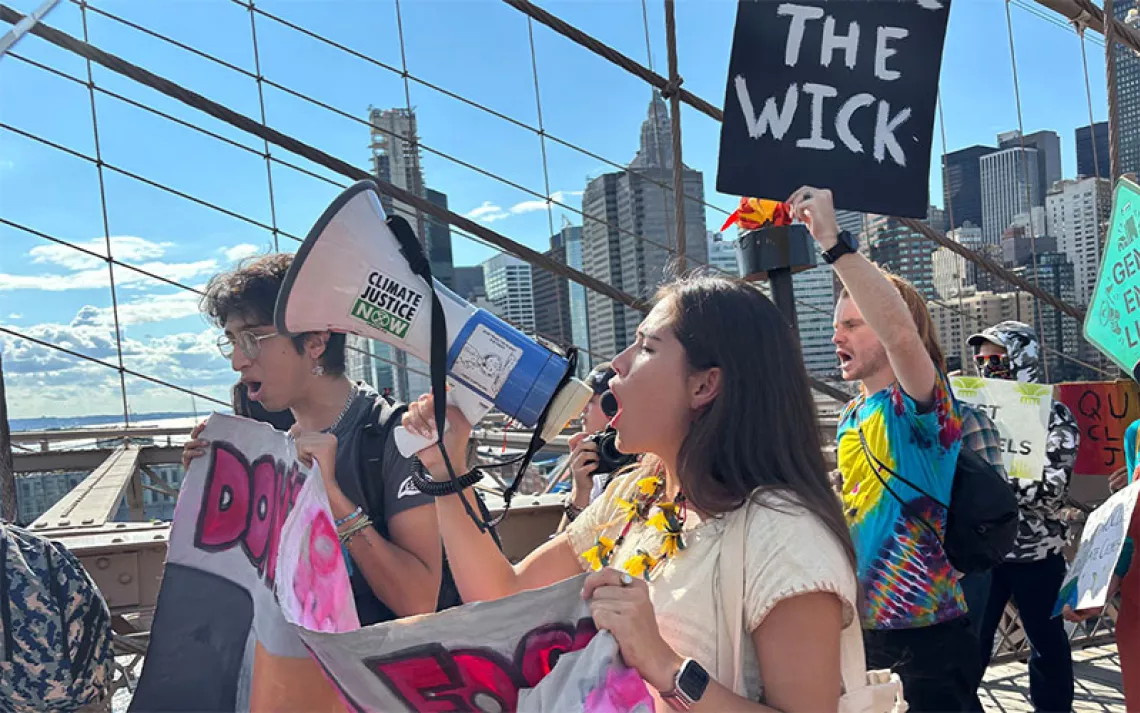Edgar McGregor Loves His Local Park
The 20-year-old climate activist picked up trash until there was none left

Photos by Edgar McGregor
It took Edgar McGregor almost two years to clean up Eaton Canyon Natural Area. Armed with a five-gallon bucket and a pair of gloves, the 20-year-old climate activist collected trash there nearly every day over 589 consecutive days. On March 5, he declared the 198-acre preserve in Los Angeles finally clean, though he still visits several times a week to pick up any new trash that appears.
McGregor learned early on that it’s counterproductive to be angry about littering. That negativity only discouraged him. “The fact of the matter is, there's always going to be litterbugs,” McGregor says. “There's nothing we can do to stop people from throwing stuff that they don't want onto the ground.”
In the spring of 2019, shortly before undertaking his cleanup mission, McGregor began climate striking, alone, outside Pasadena City Hall every Friday. He brought a board displaying the increase in average temperature in Pasadena over the past 110 years: about seven degrees Fahrenheit.
But McGregor wasn’t satisfied with his weekly protests. “I felt like I could do a lot more,” he says. “I felt like I wasn’t giving environmentalism my all.” So along with climate striking on Fridays, he started heading out to Eaton Canyon—his favorite local park—on Saturdays to collect trash along the 3.5-mile-out-and-back trail.
The park sees hundreds of thousands of visitors a year but relies heavily on volunteers to clean up trash. And McGregor says cleanup crews tend to focus only on the most popular spots. About a month in, he realized weekly trips weren’t enough to tackle the trash problem, and in late May 2019, he began going every day.
Though daily visits are a huge commitment, McGregor doesn’t find them a chore. “There are days where I will go on a cleanup for like an hour or two in the morning, and by the evening, I want to go back. I want to do another one,” he says.

McGregor is on the autism spectrum, which he thinks might explain why he’s had such success maintaining his cleanup routine. He never seems to tire of being in nature and can spend hours at a time admiring the park. And when he’s not at the park, he’s often planning his next cleanup. Once the pandemic hit, McGregor gave up climate striking on Fridays, but he continued going to Eaton Canyon.
“I love this place so much,” he says. “I mean, even on my six-hundred-and-first day out there, I'm sitting around looking at my park going, ‘this place is amazing.’ I’m so lucky that I'm able to hike here every single day.”
Extreme weather rarely fazes him. One blistering summer evening, he sweated through a 124-degree cleanup. During a windstorm so strong that he struggled to stay upright, his anemometer measured gusts over 60 miles per hour. Only wildfire smoke has kept him from the park.
“Whether it was raining, whether it was 110 degrees, whether the mountains were on fire, whether I just worked a 12-hour shift in an air-conditioning-less warehouse pushing boxes around, it didn’t matter,” McGregor says (the 12-hour shifts were during summer 2019, when he worked for a company that made bathroom appliances). “I was out there cleaning up for at least 30 minutes a day.” Usually, he stayed at the park for much longer.
One hundred days in, McGregor thought he was done. Then he realized he was only cleaning near the main trails. In the more remote areas of the park, the trash had also been piling up, sometimes for decades.
“When I started, I really thought it would only take me like two to three weeks to clean up the park,” McGregor says. “It took me about 85 weeks to finish cleaning up the park, because I vastly underestimated just how much trash there was.”

During each cleanup, he would pick a specific location and search it thoroughly, making sure that his chosen bit of park was as clean as possible. At some point, he found a second bucket and now carries two—one for trash and the other for recycling. On a day when he picks up a lot of glass, he says the buckets can weigh 15 pounds each.
Most often, he collects single-use water bottles and—more recently—disposable masks. He’s found phones, umbrellas, car tires, and even a 10-foot-tall patio heater. He says the most alarming litter to find is abandoned lighters and matches, which he fears could spark wildfires.
He trades the recycling he collects for cash and donates it to climate causes or uses it to plant native western sycamore trees in the park. Many of the young trees are struggling to withstand the hotter weather and shrinking rainy season caused by climate change.
McGregor’s strategy has changed since he declared Eaton Canyon clean. While he continues to maintain the level of cleanliness he’s achieved there, he has set his sights on new projects.
Among the parks he plans to take on next is the East Fork of the San Gabriel River, which sees millions of visitors every year and has the mountains of trash to show for it. McGregor says he once spent five hours cleaning a one-acre chunk of the park and could hardly tell the difference when he was finished. Once the pandemic ends, he hopes to bring a team of volunteers to clear out the trash.
In the fall, McGregor, who is studying natural sciences at Pasadena City College, will be transferring to San Jose State University to study meteorology with an emphasis in climatology. He intends to find a new park to clean when he moves to San Jose.
He’s also active on Twitter (@edgarrmcgregor), where he encourages his followers to begin cleaning up the natural spaces they value.
“The hardest part about cleaning up is starting,” he says. “I cleaned up one of Los Angeles’s most popular hiking trails with just a bucket and a pair of gloves and at least 30 minutes of free time per day. That's it. No planning committees, no email lists, no permits, no special equipment, none of that. Just go out there, pick up a bucket and gloves, you’re done.”
 The Magazine of The Sierra Club
The Magazine of The Sierra Club



